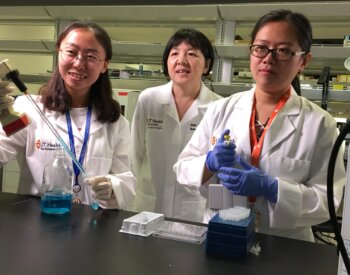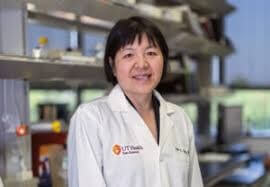Studies of cell channels lead to therapeutic antibodies in clinical trials

Jean X. Jiang, PhD, whose pioneering research has given rise to potential bone cancer and brain injury therapeutics currently under evaluation in clinical trials, will be inducted as a Fellow of the National Academy of Inventors, the academy announced Dec. 8.

Jiang is professor and Zachry Distinguished University Chair in the Department of Biochemistry and Structural Biology at The University of Texas Health Science Center at San Antonio (UT Health San Antonio). She joined UT Health San Antonio in 1997.
For a quarter-century, Jiang’s research has attracted continuous support from the National Institutes of Health, the Welch Foundation and other funders. She studies an information superhighway — called gap junctions — that facilitates cell-to-cell communication. Gap junctions, located in cell membranes, are clusters of channels through which ions and other chemical messengers travel. Proteins called connexins also form smaller channels that the researchers call “hemichannels.”
UT Health San Antonio in 2017 entered multimillion-dollar license agreements with AlaMab Therapeutics Inc., a life sciences company developing first-in-class antibody drugs. The agreements involve custom antibodies, developed by the Jiang laboratory, that impact activity of the connexin hemichannels. AlaMab Therapeutics has exclusive worldwide rights to commercialize these discoveries, which are intellectual property that belongs to The University of Texas System Board of Regents.
“One of our antibody therapeutics targets neuro-inflammatory injuries such as spinal cord injury,” Jiang said. “In inflammatory conditions, hemichannels are activated. So, one of our antibodies can block the opening of the hemichannels.” A clinical trial is ongoing.
“The other antibody therapeutic is a treatment for breast cancer bone metastasis and osteosarcoma, a type of bone cancer,” Jiang said. “This antibody targets bone cells. In this case, opening the hemichannels generates a tumor-suppressing microenvironment, which inhibits tumor growth and metastasis or spread to the bone.”
The two antibody therapeutics are based on entirely different mechanisms of action, therefore, she noted.
In addition to antibody therapeutics, Dr. Jiang’s team is actively developing new therapeutics in treating cancer metastasis and other disease indications and has founded a startup company for further development.
Jiang thanked her award nominator, Andrea Giuffrida, PhD, MBA, vice president for strategic industry ventures at UT Health San Antonio. She praised and thanked members of her laboratory who have contributed to the research discoveries. She also thanked the Office of Technology Commercialization at UT Health San Antonio, research collaborators worldwide and commercial partners.
“This is a team effort,” Jiang, who has eight published patents, said. “I feel very honored that our translational research and drug discovery work at UT Health San Antonio was recognized by the National Academy of Inventors.”
In an email, Paul R. Sanberg, PhD, DSc, FNAI, president of the National Academy of Inventors, wrote to Jiang: “The NAI Fellows Selection Committee has chosen you for induction as you ‘have demonstrated a highly prolific spirit of innovation in creating or facilitating outstanding inventions that have made a tangible impact on the quality of life, economic development and welfare of society.’ Congratulations on your achievement and well-deserved recognition as a truly prolific academic inventor.”
Jiang and other new NAI Fellows will be inducted June 27, 2023, during the academy’s 12thAnnual Meeting in Washington, D.C.
Election to NAI Fellow status is the highest professional distinction accorded solely to academic inventors. Currently, the NAI Fellow program has 1,567 Fellows worldwide, and collectively the Fellows hold more than 53,000 issued U.S. patents, which have generated more than 13,000 licensed technologies and 3,200 companies and created more than 1 million jobs. In addition, more than $3 trillion in revenue has been generated based on NAI Fellow discoveries. Among all NAI Fellows, there are 165 presidents and senior leaders of research universities, governmental and non-profit research institutes; about 642 members of the National Academies of Science, Engineering and Medicine; about 45 inductees of the National Inventors Hall of Fame; 63 recipients of the U.S. National Medal of Technology and Innovation and U.S. National Medal of Science; and 45 Nobel Laureates, among other awards and distinctions.

